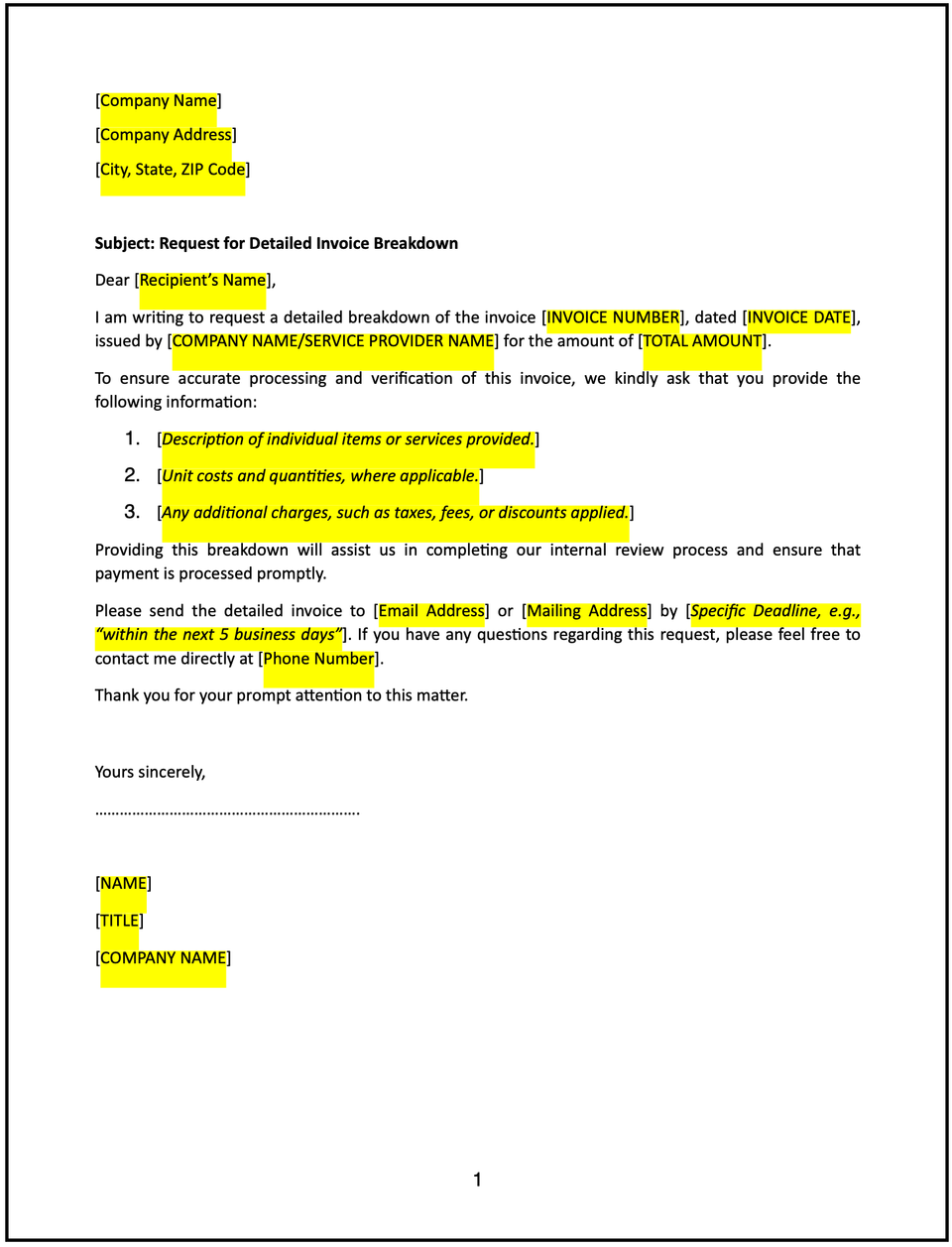Letter of request for detailed invoice breakdown: Free template

Letter of request for detailed invoice breakdown
A letter of request for a detailed invoice breakdown is a formal communication used to request an itemized explanation of charges on an invoice. This letter ensures transparency, helps clarify any ambiguities, and supports accurate financial tracking.
How to use this letter of request for detailed invoice breakdown
- Open with an introduction: Address the recipient respectfully and reference the invoice by number, date, or other identifiers.
- State the purpose: Clearly communicate your intent to request a detailed breakdown of the charges on the invoice.
- Specify the details: Mention the specific areas where you need clarification, such as service categories, hours billed, or material costs.
- Provide context: Briefly explain why the breakdown is necessary, such as internal financial reconciliation, compliance, or addressing discrepancies.
- Request a timeline: Politely ask the recipient to provide the detailed breakdown by a specific date to avoid delays.
- Offer collaboration: Reassure the recipient of your willingness to provide additional information or discuss the matter further.
- Maintain a professional tone: Ensure the letter is clear, respectful, and focused on fostering transparency and resolution.
- Provide contact information: Include details for the recipient to respond or share the requested breakdown.
Benefits of using a letter of request for detailed invoice breakdown
This letter ensures a structured and professional way to address invoice concerns while fostering transparency and collaboration. Here’s how it helps:
- Promotes clarity: Requesting an itemized breakdown ensures a clear understanding of the charges.
- Reflects professionalism: A well-crafted letter demonstrates respect and attention to detail.
- Encourages accountability: Openly requesting clarification fosters trust and transparency.
- Prevents disputes: Addressing ambiguities early avoids misunderstandings or conflicts.
- Supports financial tracking: Detailed invoices aid in accurate reconciliation and budget management.
Tips for writing an effective letter of request for detailed invoice breakdown
- Be specific: Clearly identify the invoice and the areas requiring clarification or additional details.
- Use professional language: Maintain a respectful and constructive tone to build trust.
- Provide context: Briefly explain the purpose of the request and its importance to your financial processes.
- Highlight mutual benefits: Emphasize how providing the breakdown fosters trust and supports accurate record-keeping.
- Include actionable steps: Share clear instructions for submitting the breakdown or discussing further details.
- Keep it concise: Focus on the essential points while ensuring the tone is professional and engaging.
Frequently asked questions (FAQs)
Q: What details should I include in this letter?
A: Include the invoice reference, specific areas needing clarification, and a deadline for providing the breakdown.
Q: Should I personalize the letter?
A: Yes, addressing the recipient by name and referencing specific invoice details demonstrates attentiveness and professionalism.
Q: Who typically sends this letter?
A: Finance teams, business owners, or project managers typically send this letter.
Q: How formal should this letter be?
A: The tone should be professional, respectful, and collaborative to foster trust and resolution.
Q: When should this letter be sent?
A: Send the letter as soon as the need for clarification is identified to avoid delays or discrepancies.
Q: Can this letter request a meeting or call?
A: Yes, proposing a discussion can help clarify complex charges or address any misunderstandings.
Q: Is acknowledgment from the recipient required?
A: While not mandatory, requesting acknowledgment ensures the recipient is addressing your request.
This article contains general legal information and does not contain legal advice. Cobrief is not a law firm or a substitute for an attorney or law firm. The law is complex and changes often. For legal advice, please ask a lawyer.


